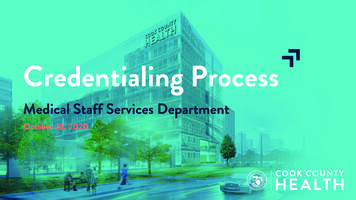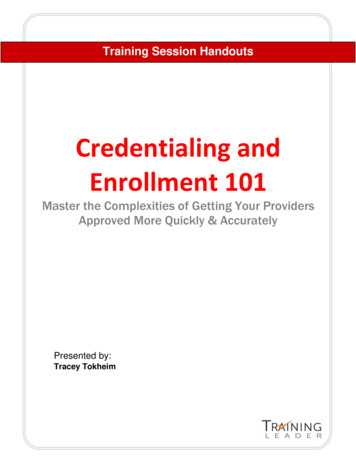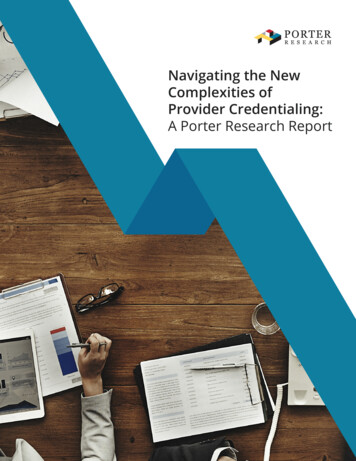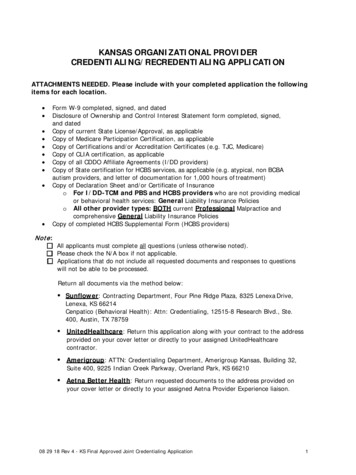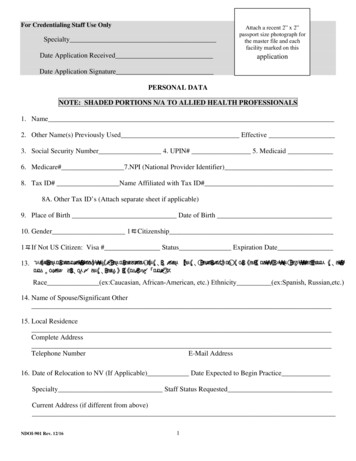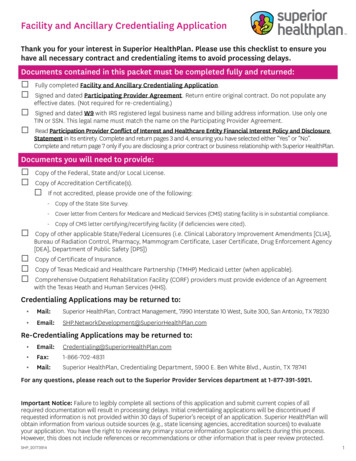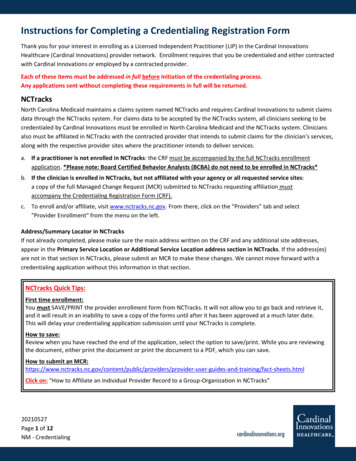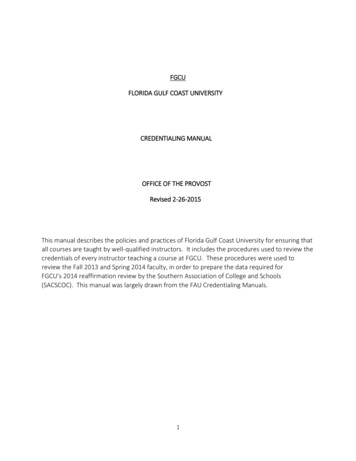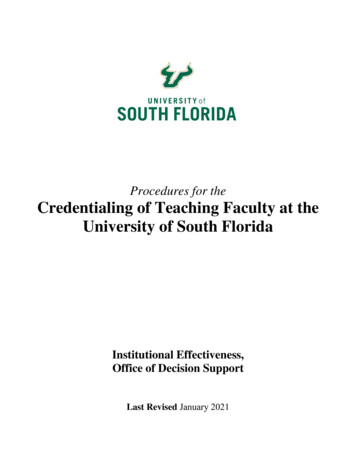
Transcription
Procedures for theCredentialing of Teaching Faculty at theUniversity of South FloridaInstitutional Effectiveness,Office of Decision SupportLast Revised January 2021
Faculty Credentialing GuidelinesFaculty Credentialing GuidelinesIntroductionLETTER FROM THE SENIOR VICE PROVOSTTo conform to the highest standards of academic excellence, the University of South Florida conductsregular verification of faculty credentials for teaching. This is to ensure that all instructors of record areacademically qualified to teach in the content area, regardless of rank or term of appointment. Thecredentialing process described in this manual is in accordance with University Policy 10-115 andComprehensive Standard 3.7.1 of the university’s regional accrediting body, the Southern Association ofColleges and Schools Commission on Colleges (SACSCOC). The contents include all procedures andother information necessary to guide faculty, department chairs, administrators and others through thecredentialing process. While each college and/or department may individualize the credentialingprocess to accommodate specific needs, all such processes must conform to the policies and proceduresfound here.Responsibility for credentialing is vested in academic departments, which are uniquely qualified to makethe credentialing decision. Colleges are responsible for documenting the results of their credentialingprocedures and making them available for audits and reports on credentialing standards. The Office ofInstitutional Effectiveness is responsible for facilitating the overall process and aggregating results asnecessary to share with relevant regional and specialized accrediting bodies.The credentialing process described in this manual must be administered at all times. Results of theprocess are verified during the decennial reaffirmation of accreditation through production and review ofa roster of all instructors of record and the courses they taught for selected academic terms. USFsuccessfully defended faculty credentials in the roster produced for the 2015 reaffirmation report but theprocess must continue to provide documentation for future reviews. Your careful participation in, andhighest level of cooperation with, this important process will be greatly appreciated, and is crucial toUSF’s accreditation.With best wishes,Dwayne SmithSenior Vice ProvostInstitutional Effectiveness in the Office of Decision Support – 2021Page 2 of 23
Faculty Credentialing GuidelinesTable of ContentsIntroduction Letter from the Senior Vice Provost .2Faculty Credentialing for Teaching at the University of South Florida. 4Requesting Exceptions to Primary Credentials .6Evaluation of Foreign Teaching Credentials .7Checklist of Faculty Credentialing Steps for Department Chairs .9Documentation of Faculty Credentials Using FACT . 10AppendicesA. University of South Florida Policy 10-115 . 12B. USF Form for Credentialing of Teaching Faculty . 15C. Justification for an Exception to the USF Criteria for Minimum Academic Preparationin the Teaching Discipline .18D. Examples of Past Departmental Statements of Teaching Credentials . 20E. SACSCOC Criteria for Teaching Credentials . 25Institutional Effectiveness in the Office of Decision Support – 2021Page 3 of 23
Faculty Credentialing GuidelinesFaculty Credentialing for Teaching at the University of South FloridaOverviewAcademic departments at the University of South Florida are responsible for insuring that all instructorsof record for credit-bearing courses are credentialed for the courses they teach. Credentialing isgoverned by USF Policy 10-115 and SACSCOC Comprehensive Requirement 3.7.1.Steps to Prepare for the Credentialing Process1. Prepare a Departmental Statement of Teaching Credentials establishing appropriate teachingqualifications for courses offered by the department. The statement must meet the minimumrequirements stated in USF Policy 10-115 (See Appendix A). Statements should cite objectivestandards for establishing the criteria, such as those maintained by specialized accreditingagencies and/or professional associations related to a discipline. Many of these criteria can befound at the websites of the relevant organizations. Related degrees that are consideredacceptable for credentialing should be included in the statement. Cases in which degrees belowthe doctorate are commonly considered the terminal degree for an area should be noted and therelevant degrees specified. In departments where teaching credentials are often based onperformance and demonstrated expertise in the discipline, documentation must be presentedsupporting the common use of the stated alternative credentials as accepted practice in thediscipline. Documentation may include statements of current practices from sources such asother institutions, specialized accrediting agencies, and certification agencies.2. Collect information that justifies and documents each instructor of record’s qualificationsrelevant to the specific courses they are assigned to teach. For faculty teaching interdisciplinarycourses, the department must provide information that justifies and documents the instructor ofrecord’s qualifications relevant to the disciplines that are components of the course.3. Complete a “Certification of Teaching Credentials” form for each instructor of record who hasnot been previously credentialed for the courses he/she is teaching (See Appendix B). The formmust be signed by the chair, and if an exception to primary teaching credentials is required, bythe dean.4. Confirm that a certified final transcript of any academic degree considered in the credentialingprocess is on file in both the college dean’s office and USF Human Resources.5. Confirm that a current curriculum vitae is on file in the department or in the FAIR Vita Bank foreach instructor of record.The Credentialing ProcessCredentials for each instructor of record should be compared to the Departmental Statement of TeachingCredentials. Documentation of this comparison is confirmed by completion of the “Certification ofTeaching Credentials” form. Possible actions resulting from the comparison are summarized below.Institutional Effectiveness in the Office of Decision Support – 2021Page 4 of 23
Faculty Credentialing GuidelinesFor undergraduate courses: If the instructor of record has a terminal degree in a discipline that matches the content of thecourses taught as specified in the Departmental Statement of Teaching Credentials no furtherjustification is required. If the instructor of record has a master’s degree in the discipline no further justification isrequired. An instructor of record may be certified to teach undergraduate courses with a master’s degree inany area and evidence of completion of 18 graduate credit hours in the discipline. The specificgraduate courses that qualify the instructor of record to teach his/her course(s) must be noted onthe “Certification of Teaching Credentials Form.” In addition, official transcripts must be on filein USF Human Resources documenting any academic course work considered in thecredentialing decision. If the instructor of record is a Graduate Teaching Assistant (GTA), he/she must possess amaster’s degree in the teaching discipline or 18 graduate credit hours in the teaching discipline.In addition, the GTA must be directly supervised by a faculty member holding appropriatequalifications in the teaching discipline, receive regular in-service training and planned andperiodic evaluations. If the instructor of record does not appear to possess primary academic credentials (as describedabove) for teaching his/her courses, alternative qualifications must be presented. All cases ofalternative qualifications (“exceptions”) must be supported by documentation on file in theinstructor of record’s departmental file and readily available if requested by the accreditingagency. All exceptions must be reviewed and approved by the dean of the appropriate college.(A detailed description of this process is provided below.)For graduate courses: If the instructor of record has a terminal degree in a discipline that matches the content of thecourses taught or in a related field as specified in the Departmental Statement of TeachingCredentials no further justification is required. If the instructor of record does not appear to possess primary academic credentials for teachinghis/her courses as listed above, alternative qualifications must be presented. All cases ofalternative qualifications (“exceptions”) must be supported by documentation on file in theinstructor of record’s departmental file and readily available if requested by the accreditingagency. All exceptions must be reviewed and approved by the dean of the appropriate college.(A detailed description of this process is provided below.)Institutional Effectiveness in the Office of Decision Support – 2021Page 5 of 23
Faculty Credentialing GuidelinesRequesting Exceptions to Primary CredentialsOverviewThe purpose of this section is to explain how to request exceptions to primary academic teachingcredentials for undergraduate and graduate teaching.Preparing a Request to use Alternate Credentials for TeachingTo prepare for a request the instructor of record should: Complete Section 5 “Additional Qualification” of the Certification of Teaching Credentials form(Appendix B). Each category of relevant competencies and achievements should be checked offin the form. In addition, each checked item must be briefly explained in the space provided.Collect and present documentation of competencies and achievements that will be offered in lieuof formal academic preparation. These include but are not limited to documentation of researchand publications, copies of professional licenses or certification, special training and relatedwork experience, documented teaching excellence in the discipline, honors, awards or specialrecognition, and other competencies and achievements.Alternate Credentialing ProceduresFor instructors of record of undergraduate courses who are not Graduate Teaching Assistants and whodo not hold at least a master’s degree and 18 graduate credit hours in the subject area taught, thefollowing actions should be taken:1. The instructor of record’s Certification of Teaching Credentials form with section 5 completedalong with supporting documents must be submitted to the department for credentialing.2. A decision must be made in the department to approve or not approve the exception.3. If approved, a justification for exception form (see Appendix C), the completed Certification ofTeaching Credentials form signed by the department chair, and copies of supportingdocumentation must be forwarded to the dean of the college. Final approval of the exception isgranted by the signature of the dean of the college on the form.4. A copy of the Certification of Teaching Credentials form signed by the department chair anddean along with the supporting documentation must be kept in the instructor of record’s file inthe teaching department. These documents must be readily available if requested by theaccrediting agency. Documents that do not verify the instructor’s credentials, such astestimonials from former students or peers, are not appropriate for inclusion.Institutional Effectiveness in the Office of Decision Support – 2021Page 6 of 23
Faculty Credentialing GuidelinesEvaluation of Foreign Teaching CredentialsOverviewAcademic departments at the University of South Florida are responsible for insuring that all instructorsof record for credit-bearing courses are credentialed for the courses they teach (USF Policy #10-115 –Appendix A). In those instances where a faculty member is being credentialed by a degree and/orgraduate credit hours from an institution in another country, the faculty member must obtain anindependent evaluation of teaching credentials. The evaluation must be completed by an evaluationservice acceptable to the University or an internal entity charged with this function. Costs, if any,associated with this service are the responsibility of the faculty member.DocumentationForeign degrees must be evaluated by an agency certified by the National Association of CredentialEvaluation Services (NACES) to establish their equivalency to American degrees. A course-by-courseevaluation is necessary for all degrees used to establish credentials for teaching. Transcripts anddocuments that are issued in a language other than English must be accompanied by a literal Englishtranslation. The translation/evaluation must include a course-by-course assessment with grades ormarks and credit hours equated to the U.S. System.The credential evaluation must be submitted to the USF Human Resources Department by the serviceperforming the evaluation and must include a copy of the original document along with an Englishtranslation. These documents must be provided at the time of initial employment and prior to thefaculty member teaching the course. If the faculty member is later assigned to teach in a differentdiscipline, additional documentation may be required.Approved Credentialing AgenciesFollow is a list of credential evaluation services that have been approved by USF.Josef Silny and Associates, Inc.7101 SW 102nd AvenueMiami, FL 33173Phone: 305-273-1616Fax: 305-273-1338Email: info@jsilny.comWeb: www.jsilny.comAmerican Association of Collegiate Registrars and Admission OfficersOffice of International Education ServicesOne Dupont Circle NW, Suite #520Washington, DC 20036-1135Phone: 202-296-3359Fax: 202-822-3940Email: ies@aacrao.orgWeb: www.aacrao.orgInstitutional Effectiveness in the Office of Decision Support – 2021Page 7 of 23
Faculty Credentialing GuidelinesEducational Credential Evaluators, Inc.P. O. Box 514070Milwaukee, WI 53203-3470Phone: 414-289-3400Fax: 414-289-3411Email: eval@ece.orgWeb: www.ece.orgAcademic Evaluation Services, Inc.5620 E. Fowler Ave, Suite ETampa, FL 33617Phone: 813-374-2020Fax: 813-374-2023Email: info@aes-edu.orgWeb: www.aes-edu.orgAdditional recommended services can be found at www-naces.org.Institutional Effectiveness in the Office of Decision Support – 2021Page 8 of 23
Faculty Credentialing GuidelinesDocumentation of Faculty Credentialing Using FACTOverviewThe Faculty Academic Credentials for Teaching (FACT) module of the FAIR (Faculty AcademicInformation Reporting) system is the repository of official information documenting faculty credentialsat the University of South Florida.ProcedureFor each instructor of record, the following must be verified and entered into FACT using the USFCertification of Teaching Credentials form. Terminal degree or highest degree that the instructor of record is using as a credential forteaching the course.Year this degree was conferredMajor of degreeInstitution conferring the degreeInstitution location if necessary (this is not necessary if the location is obvious or well-known,such as the University of Florida or the University of Alabama at Birmingham).Verification that a transcript of the teaching degree is on file at USF Human ResourcesVerification that a current curriculum vitae for the faculty member is on file in the teachingdepartment or the S.A.V.E. systemForeign credentials: Please note YES if the degree in question 1 was conferred by a foreigninstitutionForeign credentials evaluated? YES/NO. If no foreign credentials are noted choose NO or leaveblankInformation in FACT must be updated in a timely manner for new instructors of record hired each termusing the USF Certification of Teaching Credentials form.Institutional Effectiveness in the Office of Decision Support – 2021Page 9 of 23
Faculty Credentialing GuidelinesAppendix AUSF Policy on Teaching CredentialsInstitutional Effectiveness in the Office of Decision Support – 2021Page 10 of 23
Faculty Credentialing GuidelinesUniversity of South Florida System PolicyNumber: 10-115Subject: Faculty Credentials for Teaching Undergraduate and Graduate CoursesDate of Origin: 05-24-13Date Last Amended: 07-30-13Date Last Reviewed: 07-30-13I. INTRODUCTION (Purpose and Intent)This University of South Florida System (USF System) Policy is designed to address the regulations andprocedures related to faculty credentials for teaching as an instructor of record as specified in ComprehensiveStandard 3.7.1 of the Principles of Accreditation, Foundation for Quality Enhancement, Southern Association of Collegesand Schools Commission on Colleges (SACSCOC) and the SACSCOC Faculty Credentials Guidelines. The policyprovides a foundation for the execution of faculty credentialing aligned with best practices in higher education.II. DEFINITIONSAn Instructor of Record is the individual designated in the USF student information system by the academicunit as responsible for a credit-bearing course. Team taught courses may have multiple instructors of record.Faculty Credentialing, according to SACSCOC (2012), is the process by which an institution demonstrates thatit “employs competent faculty members qualified to accomplish the mission and goals of the institution.”Credentialing must be evidence based and demonstrably executed.III. STATEMENT OF POLICYAll instructors of record for each credit-bearing course taught by the University of South Florida must, at aminimum, meet the expectations for faculty credentialing delineated by SACSCOC in Comprehensive Standard3.7.1 of the Principles of Accreditation: Foundation for Quality Enhancement and the SACSCOC Faculty CredentialsGuidelines. The University of South Florida System will require the following as evidence of faculty qualifications.1. Instructors of record teaching general education courses at the undergraduate level and/or baccalaureatecourses will hold an earned doctorate or master’s degree in the teaching discipline or a master’s degree with aconcentration in the teaching discipline (a minimum of 18 graduate semester hours in the teaching discipline).2. Instructors of record teaching graduate and post-baccalaureate course work will hold an earneddoctorate/terminal degree in the teaching discipline or a related discipline.3. Graduate teaching assistants who are instructors of record must hold a master’s degree in the teachingdiscipline or 18 graduate semester hours in the teaching discipline, and will be directly supervised by a facultymember holding appropriate qualifications in the teaching discipline, will receive regular in-service training, andwill receive planned and periodic evaluations. Graduate Teaching Assistants (GTA) may provide support to aqualified instructor teaching a graduate course, but the GTA may not be the instructor of record and may notassist with teaching a graduate level course that the GTA may subsequently take at some time in their degreeprogram.Exceptions may be made for individuals who do not meet the above qualifications but who are considered bythe department to possess other demonstrated competencies and achievements that provide evidence to supportInstitutional Effectiveness in the Office of Decision Support – 2021Page 11 of 23
Faculty Credentialing Guidelineseffective
Faculty Credentialing for Teaching at the University of South Florida . Overview . . The credential evaluation must be submitted to the USF Human Resources Department by the service performing the evaluation and must incl
